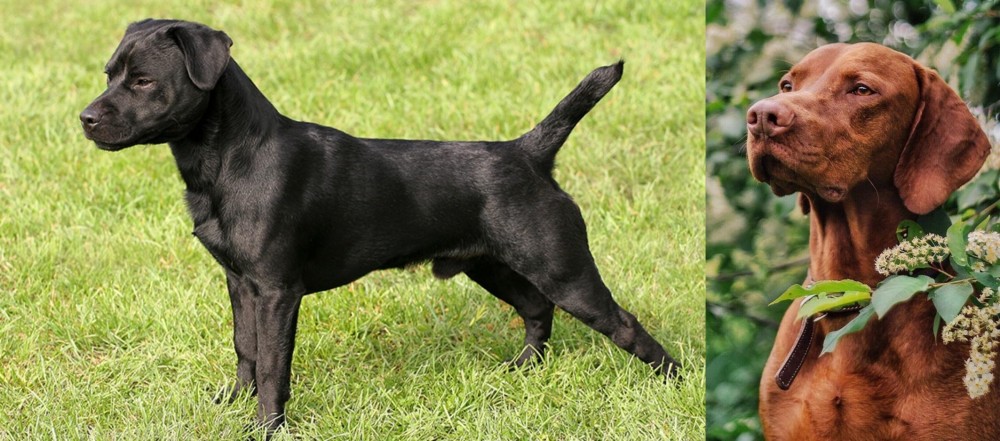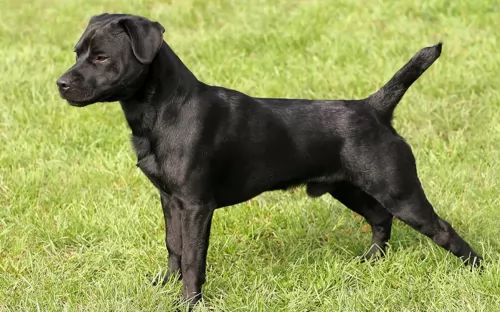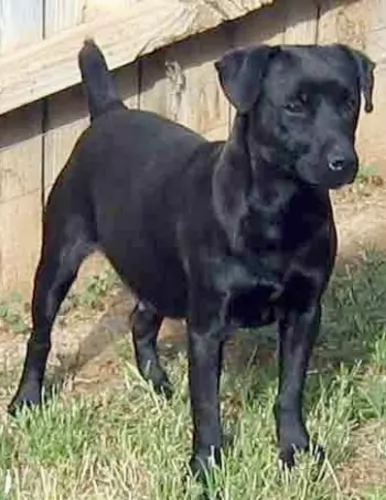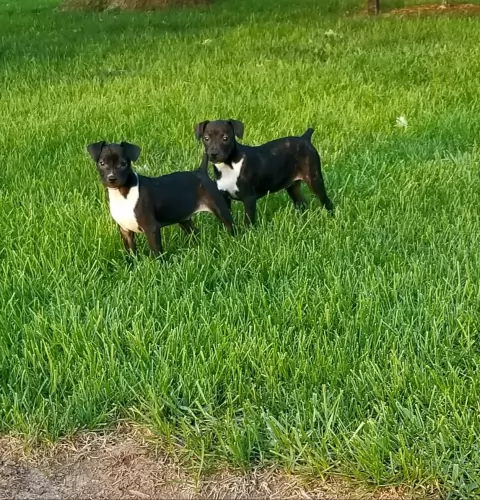 Petzlover
Petzlover Patterdale Terrier is originated from United Kingdom but Vizsla is originated from Hungary. Patterdale Terrier may grow 12 cm / 5 inches higher than Vizsla. Patterdale Terrier may weigh 23 kg / 50 pounds lesser than Vizsla. Patterdale Terrier may live 3 years more than Vizsla. Both Patterdale Terrier and Vizsla has almost same litter size. Both Patterdale Terrier and Vizsla requires Low Maintenance.
Patterdale Terrier is originated from United Kingdom but Vizsla is originated from Hungary. Patterdale Terrier may grow 12 cm / 5 inches higher than Vizsla. Patterdale Terrier may weigh 23 kg / 50 pounds lesser than Vizsla. Patterdale Terrier may live 3 years more than Vizsla. Both Patterdale Terrier and Vizsla has almost same litter size. Both Patterdale Terrier and Vizsla requires Low Maintenance.
 The Patterdale was developed in England,with his origins being linked to an early breeder with the name Joe Bowman.
The Patterdale was developed in England,with his origins being linked to an early breeder with the name Joe Bowman.
They were sought after for their prowess at guarding sheep from foxes. The dog was recognized by the United Kennel Club in 1995. It is believed the dog is descended from the Northern terrier breeds and can be traced far back.
 The Hungarian Vizsla or Magyar Vizsla is a hunting dog developed in Hungry. It is the smallest of the pointer-retriever type breeds. They are loyal family dogs and hunt fowl and upland game. It was rare for a hunting dog to also be a companion and family dog, but the Vizsla is. The first time the Vizsla came to the attention of anyone outside its area was 1357 in a publication written for King Louis I of Hungary. They were kept mostly by barons and warlords and preserved without any interbreeding for centuries.
The Hungarian Vizsla or Magyar Vizsla is a hunting dog developed in Hungry. It is the smallest of the pointer-retriever type breeds. They are loyal family dogs and hunt fowl and upland game. It was rare for a hunting dog to also be a companion and family dog, but the Vizsla is. The first time the Vizsla came to the attention of anyone outside its area was 1357 in a publication written for King Louis I of Hungary. They were kept mostly by barons and warlords and preserved without any interbreeding for centuries.
Through all the occupations, revolutions and world wars, the Vizsla survived. Still there were some points in their history where they were almost extinct. In the 1800’s English Pointers and German Shorthaired Pointers almost replaced them. After World War II they were almost extinct again with only a dozen or so left in the country.
Breeders across Hungry brought them back again. They were also bred in Serbia, Slovakia, Austria and Romania. They came to the states after the war and quickly were embraced. The Vizsla Club of America was formed so that they could be recognized by the American Kennel Club. This happened in 1960 and the Vizsla quickly became a champion in several AKC specialties.
The Weimaraner, the German Shorthaired Pointers, the Wirehaired Vizsla and other pointers were developed from the Vizsla and then used to re-establish the breed following World War II.
 The Patterdale Terrier is a small sized dog that stands at between 25 and 40 cm in height and weighs 5 to 7kg.
The Patterdale Terrier is a small sized dog that stands at between 25 and 40 cm in height and weighs 5 to 7kg.
The coat of the dog can be smooth, broken or rough, but all coats are double and weatherproof. Colors include red, liver, black, bronze, black and tan or chocolate and sometimes brindle. The ears are floppy and medium length and the tail is also medium length and held high, curving slightly. It used to be docked and then ¼ to 1/3 of the tail was removed.
The Patterdale Terrier is small but he is bold and confident and very energetic. He will certainly need to be in a household where the family members are active, busy people. Because he is strong-willed he will benefit from training and socialization which will make him obedient and able to behave well in different situations.
 The golden/rust colored Vizsla is easily distinguished from other breed. They are a medium sixed pointer with a lean frame and light on their feet. They have long ears that are silky to the touch and well defined muscular structure. Their nose is a red color blending in with their coat color. Their eyes and nails also blend in with the color of the coat.
The golden/rust colored Vizsla is easily distinguished from other breed. They are a medium sixed pointer with a lean frame and light on their feet. They have long ears that are silky to the touch and well defined muscular structure. Their nose is a red color blending in with their coat color. Their eyes and nails also blend in with the color of the coat.
For the most part they are some shade of golden-rust, but today there are also some solid rust dogs as well. Officially the coat can be russet gold, copper-brown, or dark sandy gold. It cannot be mahogany red or pale yellow. The coat is dense, smooth, short and without an undercoat. They have docked tails as well.
 Intelligent, courageous and feisty, the Patterdale Terrier is a dog that will get on well with everyone in the house. Those who are active and outdoor types will be the best kind of dog owners for this active, energetic dog.
Intelligent, courageous and feisty, the Patterdale Terrier is a dog that will get on well with everyone in the house. Those who are active and outdoor types will be the best kind of dog owners for this active, energetic dog.
The Patterdale is confident and strong willed and will do superbly well with some training and socialization. With lots of love and care, your Patterdale Terrier can make you an excellent family pet and companion.
 The good news is that terriers have few health problems and they can live to a ripe age. Just like other dogs, they can also battle with some of the common dog ailments there are.
The good news is that terriers have few health problems and they can live to a ripe age. Just like other dogs, they can also battle with some of the common dog ailments there are.
Most allergens are foods, medicines or insects and exposure to the allergen can cause an over-reaction. In a dog, the most common symptom associated with allergies is itching of the skin. It can drive your pet mad as he licks and bites his skin. The symptoms of allergies can involve the respiratory system and he will have coughing and sneezing or even a discharge from the eyes.
Your Patterdales can also develop cataracts and glaucoma – two kinds of eye diseases. Glaucoma can unfortunately lead to blindness but something can be done if you recognize the signs. There are 2 main types of canine glaucoma, characterized by pressure inside the eye which can do damage to the retina and optic nerve – primary- and secondary glaucoma. Your vet will try to determine whether your pet has primary or secondary glaucoma to determine treatment.
 The Vizsla have few health issues but the ones they do have are quite serious. They include:
The Vizsla have few health issues but the ones they do have are quite serious. They include:
• Cancer (Mast cell, Lymphoma and Hemangiosarcoma) – as will most dogs it can be treated but is still likely to kill the dog.
• Hip dysplasia is rare, but cases have been noted. Can cause lameness and/or arthritis.
• Sebaceous adenitis – rare skin disease found more often in cats or birds than in dogs.
 Your Patterdale Terrier has a lot of energy, so as a responsible dog owner, you will need to see that he is exercised properly. This will include a walk every day as well as spending time throwing balls or a frisbee for him. He is a working breed and has been used to being mentally and physically stimulated.
Your Patterdale Terrier has a lot of energy, so as a responsible dog owner, you will need to see that he is exercised properly. This will include a walk every day as well as spending time throwing balls or a frisbee for him. He is a working breed and has been used to being mentally and physically stimulated.
The Patterdale Terrier isn’t a high maintenance dog and his coat will simply require a brush twice a week. Your pet can’t tell you about any pain he is experiencing so you will need to watch his body language.
Dogs can easily pick up an ear infection and this can be very painful. When you brush your pet, check inside his ears for signs of redness and discharge and check inside his mouth to see if you can spot any rotten teeth. Bad teeth can wreak havoc on his health. Keep the nails trimmed.
If you intend feeding your pet commercially manufactured food, good and well because it is a convenient way to feed your pet, but make sure its a quality food. This will ensure your dog is getting in the right amount of vitamins and minerals.
To vary his diet just a bit, provide him with some home-made food such as boiled chicken, brown rice or pasta, and some wholesome vegetables such as carrots, spinach and sweet potato. Dogs love the simplicity and nutritional value of food like this, and they don't have to worry about getting a stomach ache from strange foods. Try and include some raw meat into the kibble from time to time as well.
Never leave your Paatterdale Terrier without a constant supply of fresh cool water.
 Feeding the puppy This is a very active dog and he need a high calorie diet as a puppy. Feed 4-5 cups in 3-4 smaller meals per day.
Feeding the puppy This is a very active dog and he need a high calorie diet as a puppy. Feed 4-5 cups in 3-4 smaller meals per day.
2.Feeding the adult Feed the adult high calorie food if you exercise her enough. Feed 3 cups of food twice a day.
4. Exercise They love to run but don’t’ overdo it until they are at least 18 to 24 months old. They stay very playful their entire lives and excel at AKC competitions. They are good at agility, field trials, scent work, obedience, conformation, dock diving, rally, lure coursing, track and barn hunt.